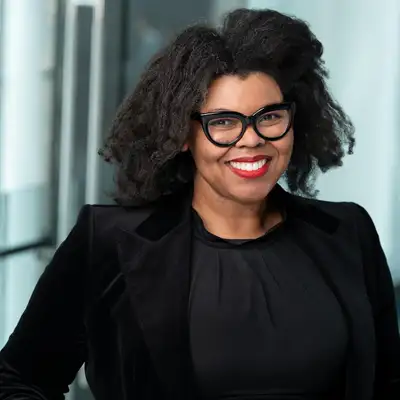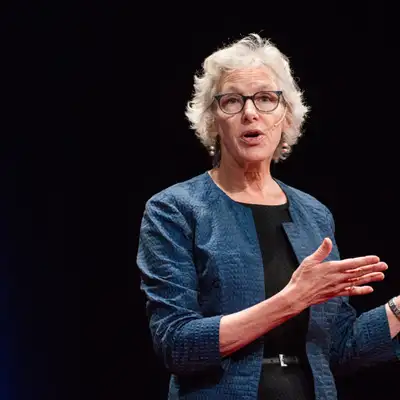Creators and Guests
What is Transforming Tech: Advancing Innovation Through Inclusion?
You work at a tech company, and you want to do the right thing: You want to hire people from all backgrounds, and you want to make sure your workplace is inclusive. But where do you start? What do you do?
Join entrepreneur, computer scientist, and CEO Jamika Burge in this five-part series from the National Academies of Sciences. Based on research and analysis from the National Academies consensus study “Transforming Trajectories for Women of Color in Tech”, Burge and her guests use design thinking to help engineering and tech companies recruit, retain, and advance women and people of color in their ranks.
Each episode will give you actionable solutions to increase diverse people and perspectives. Inclusion isn’t impossible. Let’s transform tech.
Rocio Van Nierop (00:07):
We are at a pivot point. We need to be the hiring managers. We need to be the CEOs, the investors, the bosses, the [foreign language 00:32:28], and that'll only happen if we step up and you allow us.
Jamika Burge (00:19):
The voice you just heard is Rocio Van Nierop, the founder and CEO of Latinas in Tech. And what she says is true for all women of color in tech. Many people currently in tech leadership believe that they offer equal opportunity for employees to advance. This may be the intention, but the data tell another story. Women of color are hungry for advancement. We are well qualified, but we are underrepresented in leadership positions. We are not the hiring managers or the CEOs. And, that's a situation that won't change unless those who are currently in leadership positions recognize the talent they are leaving behind.
Jamika Burge (01:08):
Welcome to Transforming Tech, a five-part series that will help tech companies of every size achieve their diversity goals. In our previous episodes, we looked at barriers that women of color face in recruitment and retention in the technology space, and the actions that companies can take to increase representation during both of those stages. In this, our final episode, we'll talk about the barriers that women of color face as they advance in the workplace, and how overcoming bias can actually help companies advance top talent.
Jamika Burge (01:46):
Women of color offer deep skills and abilities to leadership in tech, but we remain especially underrepresented in leadership roles. Women tend to leave tech at a higher rate than in science or engineering fields. And in many cases, that's due to a lack of advancement. About one third of Asian, and Hispanic, and Latinx women report that they don't feel are advancing in their company, and 50% of Black women report the same. In addition, women of color often start from disadvantaged positions in the workplace, hired as contractors or part-time. Not only does that mean they often end up without the benefits and training to help them succeed, but it's even harder to advance in the company. It's especially difficult to advance when you don't see people like yourself. When Van and Nierop started Latinas in Tech...
Rocio Van Nierop (02:38):
We officially started five years ago as an incorporated non-profit, but it was 10 years ago when we started getting together. I am a Latina that used to work in tech or still works in tech, in a way. And, it wasn't common to see another one for years and years. I started in the early-2000s. And, it wasn't until 2012, I think, or 2014 that a few of us started getting together. And, we were not in the most common way of seeing Latinos or even people of color. Latinos speaking Spanish, you would find them emptying the trash cans or serving you food, but never in a cubicle, or in a desk, or in an office. Imagine a private office, that's unheard of. And I had a senior manager position. And, when I met another one, we started to get together once a month and that group started expanding as tech companies started expanding to Latin America, more and more, Latinas started joining.
Rocio Van Nierop (03:38):
But even today, that we're 30,000 Latinas, we're still less than 2% of the tech workforce in the U.S., and that is just not where it should be, given that we're about a third of the population, and almost 50% of the population in California. Latino community is $2.8 trillion of the American GDP. If we were a single national economy, we will be the sixth in the world... The fifth, I'm sorry. Above France, and right under the UK. We are the youngest demographic. We're an average of 29 years old when others-
Jamika Burge (04:18):
In the tech space, you're saying?
Rocio Van Nierop (04:19):
... No.
Jamika Burge (04:19):
In general?
Rocio Van Nierop (04:20):
In general.
Jamika Burge (04:21):
Good context.
Rocio Van Nierop (04:22):
Yeah, we are many. We are many. But then, we're only 2% of the employees, so let's bring it back. I talk about this almost $3 trillion of the economy. Well, no, 2.8. There's a big chunk of money if you put it in dollars. But, we're the main consumers of industries like media industry and WhatsApp. Do you know who buys the most? You just said the more Latinos, but we're only one to 2% of the employees, and Meta is in Silicon Valley, where in California we're almost 50% of the population. It just doesn't make any sense. And then add to that, the fact that we're 90% based on our own research, we have 30,000 Latinas, so we have a very good sample. 90% of them have bachelor's degree or above. And the years of it working in the same position is six years, the median, it just doesn't add up. So the companies are under-utilizing them, not promoting. So the system has to be proactive. But we need to know where we're limping as a culture and fix it.
Jamika Burge (05:25):
This isn't just a failure of recruitment or retention, though it is those things. It's a failure of advancement. Van Nierop notes that the Latinas in her organization are spending too long in the same positions without promotion. And, throughout her years of working in the tech industry, Van Nierop encountered a lot of research about why women of color aren't in leadership positions. What are some factors that often make it difficult for employees more broadly, for anybody who wants to advance, to actually advance within a company? So, what things make it hard for people to advance?
Rocio Van Nierop (06:07):
Yeah, that's a very good and loaded question, loaded because it is complicated, especially for all minorities, and then you're a minority and being women, and then adding to the mix, many of us are international. We might have been born in this country, but to parents that were not. And, we have an additional culture embedded in our wad. And, the way we react to things at work might not be what you would be taught in the American culture. For our parents, or mothers, or grandmothers, teachers, [foreign language 00:06:41]. That means, "Be quiet, you look prettier. Just work hard. Work hard and don't ask for anything, because somebody will come and tap you in the back and say you are going to be promoted."
Rocio Van Nierop (06:53):
So because our culture was taught like that, they are not used to standing up and talking. Even though, we have a bad stereotype of we're lousy, they don't speak up for themselves. They might be passionate, but they don't advocate for themselves as they should. So imagine work or tech work is that game. They're not playing by the same instructions. Even if they are born to American, or say, sorry to Mexican parents, or second, or third generation, they still have the Latino culture embedded and there are many things that they need to unlearn.
Jamika Burge (07:27):
Some of this could point to things that we as women of color need to unlearn. That is, we've learned behaviors during our formative years that we may need to overcome, but who we are intrinsically comes with a lot of benefits too.
Rocio Van Nierop (07:44):
So, I need to be proactive here. And I cannot sit down and whine, because if I sit down and whine and wait for the system to happen, all I'm going to have is I'm going to run out of tears. So I need to just go ahead and do it with a good positive attitude, not for them, for me, for me. And, I need to focus on shining, or making the best job I can. That's what I've always done. That's what my culture told me. That's what my parents told me. That's what probably your parents told you too. We shine and I don't care what people say about any demographic. I shine. So I'm not going to let absolutely anybody to say I under-deliver. So now that I know that I deliver, I speak up. This is where we're failing, because if we're delivering and we're not leaving any question to our work, then I deserve that promotion.
Rocio Van Nierop (08:30):
And it's not all about promotions and money. It's about, "Give me that project. Get me to that team. Invite me to that meeting. Get my name known." And I am the owner of that more than anybody else. So, if you ask me what can I do? I get myself a mentor. I mentor somebody else, because I'm also part of that food chain. I mentor. I get myself a mentor. I find myself role models. I read a lot. I educate myself a lot, because education doesn't finish at school. And, I just never stop and I never doubt myself.
Jamika Burge (09:10):
Positive attitude and not giving up, that is such an intrinsic part of, I think, an unspoken part of the tech experience. It's a tough work, right? It's a tough job. Learning how to do tech well and even thriving, but knowing that you've got what it takes to succeed, whether we call that emotional intelligence or an ability to ability work through, given the grit that helps us to proceed, that piece is so important, because if you don't believe that you've got what it takes, then how do you help others to see that you've got what it takes as well, which is the other part that you mentioned there. Focus on shining. I love that. And when you shine, you deliver. And in delivering, not being afraid to speak up about the work that you do, that's huge. And, personally, I'm one of those folks who was told the same thing, do the work and your work will speak for you, but that is not how it works in the world, right?
Rocio Van Nierop (10:09):
Yeah, yeah.
Jamika Burge (10:09):
You have to be able to talk about your work, and not just talk about your work, talk about the impact of your work. That impact matters. And so, getting on the right projects, sitting at the right table in the right meetings with the right people absolutely allows for that level of impact in ways that we don't always connect with. And, I think, the way you've described this means that there's inherently an opportunity for us, as women of color, certainly as Latinas, to think through and talk about how do we break the cycles of our own barriers that can keep us from being heard, seen, and advanced, which is, again, the purpose of our conversation.
Jamika Burge (10:55):
And then, the last thing I want to mention here has a lot to do with acknowledging our superpowers. You mentioned being multilingual and multicultural is really the value of speaking multiple languages and looking beyond an accent, for example, and recognizing that not doubting ourselves really helps us to shine in ways that others can also see the value, the international perspective that we bring, especially if we are coming from degreed institutions and other spaces in other parts of the world.
Jamika Burge (11:33):
And so, I really appreciate all of these call-outs, because it means that there are some things that we might be able to do individually to acknowledge our differentiated experiences and to use that for our own advancement. We have superpowers and we can learn to use them. But honestly, many of the other problems we face as women of color in tech are more systemic. Remember our discussion of the types of bias in episode three with Joan Williams? She's the Sullivan professor of law and founding director of the Center for Work-Life Law at the University of California Hastings Law. As the founder of Bias Interruptors, she has shown that bias does not stop with hiring or with retention.
Joan Williams (12:22):
There's a huge amount of bias in performance evaluations, as we've talked about. Women go back to the tightrope again, this happens in interviews as well, in the interviews and performance evaluations, very often, women are basically faulted for not being feminine enough. "She's too aggressive. He's utterly assertive. But she's too aggressive. He's showing leadership ability and ownership, but she doesn't understand what her role is and is trying to color outside the lines. He was outraged because someone had jeopardized our ability to meet this business goal. She was an angry black woman who was very difficult to deal with." Unfortunately, that tightrope bias is super common in performance evaluations. So, if you don't build bias interrupters into performance evaluations, bias is going to affect your performance evaluations, and that is going to affect people's ability to be promoted.
Jamika Burge (13:25):
Bias can also creep in, in seemingly positive ways. As an example, Williams recalled an intervention that Bias Interrupters did with a company.
Joan Williams (13:36):
The first year we looked, there was lots of racial and gender bias, lots. Only 9.5% of the people of color, for example, had leadership mentioned in their performance evaluations, that was over 70 points lower than white women. But white women at that company had a different problem. A fifth of them, 18%, had comments in their performance evaluations that they didn't want promotions, presumably because of motherhood. And so, in year two, one of the things that was said in that one-hour training was not to assume someone didn't want a promotion, unless you'd had a conversation with her and she said she didn't. In year two, only one woman in the entire company got that comment. And, the bias against people of color really, really plummeted. Didn't disappear, but it really, really decreased. But the most important thing is that all groups, including white men in year two, got more improvement-oriented feedback. And you have to believe that a company that is giving their people specific, actionable, improvement-oriented feedback, is going to become a more effective company over time.
Jamika Burge (14:53):
Some of that improvement-oriented feedback might involve taking more career-enhancing work, the glamour work that gets noticed when people come up for promotion. But, as Williams has pointed out in previous episodes, even if women of color want a promotion, sometimes they cannot get the work that would get them there.
Joan Williams (15:13):
Another common form of tightrope bias reflects who gets access to career-enhancing work. Across our datasets, and we have datasets for a number of different industries and a number of different organizations, over 20,000 people. And what we signed is that about 80 to 88% of white men say they have fair access to career-enhancing work. But the same question for women of color, sometimes only as low as 50% say they have a fair access to career-enhancing work. So, that is another tightrope effect that has profound, profound effects when it comes to promotion and retention.
Jamika Burge (15:57):
This is due to persistent bias. In this case, Williams is referencing tightrope bias. The idea that women need to be aggressive, demanding that career-enhancing work, but they also need to be seen as feminine. They can't demand too hard or they'll come off as unpleasant. Often women, particularly women of color, have to prove they can even do the basic work over and over and still they will never get tasked with work that helps them thrive, work that they can sink their teeth into and love, no matter how many degrees or qualifications they may have.
Joan Williams (16:33):
Women of color also literally need to reach a higher standard in order to have their work seen as equal in quality to that of a white man. That's the privity bias.
Jamika Burge (16:50):
Putting women of color into leadership positions isn't just about doing the right thing, it's good for business. There is plenty of evidence showing that companies with more people from historically minoritized groups perform better than companies whose leadership is less diverse. So how do we make that happen? How do we help companies overcome their biases and promote women of color at the rates at which they deserve to be promoted? The same rates as everyone else? If we know, to your point, that one-third of the people are Latino, and if we're not seeing that level of representation among leadership in tech companies, from women of color, what can we do? What can a company do to get closer to providing that level of representation? Because it's not going to happen overnight, but what can they do right now?
Rocio Van Nierop (17:45):
So I think they need to get real. All companies now say they are sustainable and that they care about the ESGs and its environment, the social impact, and the governance, and that makes or breaks their goals in everything. So, the boards really care. But then you see this thing, where they're like, "Yeah, we are diverse. We have a person. We have a diversity and inclusion expert. We have a person that's clearly diverse, Asian or female or Latino. It is clearly diverse. We're done. Check. Next." Sit down and see what you're really doing, because you would listen to what they have to say. You would give them the budget to really include them in the table. It's not just putting them in the table, it's listening and executing. Even if they sit it at the table, they still feel invisible on behalf of all the minorities.
Jamika Burge (18:39):
Get real. Advancement of women of color isn't just about ticking a box and calling it a day. Some of getting real is, like we discussed in our recruitment and retention episodes, getting real data. After all, as we mentioned in our episodes on retention, women, particularly women of color, end up doing a lot of the office housework. The underappreciated work that doesn't lead to promotion. Is that happening at your company? There's one way to find out.
Joan Williams (19:09):
What is the work that leads to promotions? The managers need to sit down and develop a typology of the glamour work, and then they need to keep track for a few months of who's doing the office housework, and who's doing the glamour work. And believe me, once they do, that data tells a tale.
Jamika Burge (19:28):
All right, we've decided to get real. But what does that look like? What does a company that successfully retains and advances talented women of color do that other companies don't? It starts with data, of course. And a friend and colleague of mine who loves data is Dwana Franklin-Davis, the CEO of Reboot Representation. Reboot Representation is a coalition of leading tech companies that aims to double the number of black, Latina, and Native American women graduating with baccalaureate degrees in tech by 2025. As part of that work, Reboot Representation offers free tools and resources that help companies better recruit, retain, and advance women of color in the workplace. One of the tools Franklin-Davis wants companies to use is data. Not just generalized data, but disaggregated data, as we discussed in previous episodes.
Dwana Franklin-Davis (20:29):
We're going to disaggregate, at a very minimum, by race and gender. And then, there's all these other things that companies are starting to look at. So, are they a caregiver? And so, what does that look like? So, if I'm a caregiver, what does it look like if I'm taking care of elders in my home or community? I'm a sandwich generation child right now, I'm taking care of my mom and I've got little kids. And then, are they a veteran? LGTBQ+? You can't say, "Okay, we're desegregating data and we've noticed that we're not advancing our women of color." And so, now they need to have an intentional focus. And that could be doing some sponsorship programs, it could be doing some leadership training, but they then need to go a little bit deeper to say, "What's missing? Why are we not advancing this specific population?"
Dwana Franklin-Davis (21:15):
So, there is no silver bullet, there's no one size fits all, but you don't have a baseline foundation if you're not collecting and desegregating your data to even know where to start. And also, exit interviews. So, we should be collecting and desegregating data on exit interviews. So, "Do you know why your people are leaving?" So, understanding who your employees are helps you or helps the company intentionally design programs and initiatives that are going to be beneficial to all of their employees.
Jamika Burge (21:46):
What are those programs and initiatives? Some of them could be mentorship and sponsorship. A mentor and sponsor can be the same person, but often, Franklin-Davis notes, they are not.
Dwana Franklin-Davis (21:59):
So, the mentor is going to be the one giving you guidance, like a coach. They're answering your questions. So, let's say, your early career, you're working on your resume, they're going to give you the feedback on the resume. Let's say, you're applying for a job, they're helping you practice. So, they're help preparing you, giving you the tips, the tricks, the antidotes, etc. Your sponsor is going to be that person that is advocating for you behind closed doors. So they're the ones that are saying, "Yes, that employee, I know they can do it. They've done a great job. I think they'll be perfect for this next special assignment." Or, "I think they're ready for the promotion."
Jamika Burge (22:36):
Mentors can be especially important in helping people from traditionally marginalized backgrounds work their way into the company culture.
Dwana Franklin-Davis (22:44):
It's those things that no one talks about where you have people that are in your home, or your community, or in your network that are able to tell you those things on, "Do this, not that. Dress this way, not that way." So, from every stage of early career, to mid-career, to hopefully senior executive levels, there are these things that we just don't know about unless we have access and exposure to. We want women to be armed with what should you ask? What should you know? What should you be looking for in your next opportunity? Or are you at a great company and maybe you just don't know what's available to you? So, just wanting to make sure that we have the power to ask.
Dwana Franklin-Davis (23:22):
And if you don't like the answer once you've asked, then be able to give you the power to change your scenario. I don't think it's something that people are deliberately keeping. I think it's just that when you haven't had experience or exposure, you maybe not understand or recognize that it's something that you should be aware of. And so, how do you ask the questions that you don't know what to ask? Or how do you know how to maneuver through a situation if you don't know what situation you need to maneuver through? So, that's where sponsorship comes in, or your mentors, both mentors and sponsors, where that can come in to help you navigate through the things that you don't know.
Jamika Burge (24:00):
When advancing women of color in tech, sponsorship is especially important. There is abundant evidence showing that women in the workplace are over-mentored, but under-sponsored. Managers might think it would be easy to just start recommending more women of color for promotions. Poof, done. It's not that simple.
Dwana Franklin-Davis (24:23):
I have a personal story where I had mentors and sponsors that got me to my first vice president level role. And, when I was looking around and thinking about how I was going to get to that next level, I realized that the same sponsors that got me to my VP level role were not going to be the sponsors that got me further to other additional executive roles. And so, I realized that I needed to build new sponsor. So, I was part of a leadership training program and there were 30 of us in the room. There was an executive that came to one of our sessions. And, at the end of the session he says, "I will sponsor all of you." And, in my head, I'm like, "That doesn't even make any sense." He doesn't know any of us. And so, how's he going to be an advocate for 30 people he doesn't even know?
Dwana Franklin-Davis (25:12):
So, later on that evening, he was at the happy hour. Everybody's now wanting to grab his ear and tell him a thing, whatever. And so, when I had my moment with him and he's basically, "Yeah, how can I help you?" And I was like, "No, no, no. I'm going to help you." And he looked very surprised and shocked by that statement. And I said, "I want to do this special project." And, I listed what the project was. It was going to help his organization, help my organization, got my executive involved, and it was a long-term project. It wasn't something that was short and quick. And I said, "At the end of this, you're going to understand who I am. You're going to understand my work ethic. I'm doing something that's going to advance the company, it's going to advance your organization, going to advance my organization. And then, by the end of this, you'll be able to officially sponsor."
Jamika Burge (25:57):
Mentors and sponsors can help women of color prepare for and achieve advancement in tech. But there's another insidious barrier that Franklin-Davis brings up. One that has become especially obvious since the COVID-19 pandemic.
Dwana Franklin-Davis (26:14):
So, proximity bias is when the person who is near, so in this case, the person who's come into the office who has the visible site of leadership, where they get the advantages, they get the water cooler talks, they get the opportunity to go out to lunch or go to the cafeteria and build the informal relationship.
Jamika Burge (26:38):
Proximity bias is another unconscious bias, like the others we've talked about in previous episodes. It's not any one person's fault. Of course, you have the people you've seen most recently at the top of your mind when you're thinking about projects or promotions. But with more and more people working remotely, proximity bias can affect the people who might be doing the most work if managers see them the least. We've talked in previous episodes about how women of color often benefit from working remotely and how we feel freedom when we don't have to navigate the work cultures that were not built for us. Unfortunately, when women of color aren't present for projects or promotions, proximity bias means we might as well not exist.
Dwana Franklin-Davis (27:24):
Walking down the hall, "Hey, oh yes, John, I think that I have this project. You're here. So, can you just knock this out for me real quick?" And so, you're getting the special assignments and the special projects. And so, what that's doing is building John's credibility. That's building John's relationship with the boss, the leader, the mentor. And that doesn't mean that the woman or woman of color is less than, but she wasn't there to informally build. And so, as we are now in this world of navigating a remote work or hybrid work rather, making sure that there is intentional opportunity to build and connect, whether you're creating it for yourself or whether the leaders are in that space of making sure that they're creating it or being aware of the proximity bias is something that is, I think, a new thing in this new world of how we are working.
Jamika Burge (28:19):
But the best fight against proximity bias is knowing that it exists. A manager or an employee who wants to work from home can make sure they stay virtually proximate, staying top of mind to their managers.
Dwana Franklin-Davis (28:34):
If I want to work from home and I know that this is how this works for me, and my life, and my situation, I know that I'm going to do the best job ever. You have to maybe set up weekly touch points with your boss. Do you have a person on your team that you're connected to? Maybe set up weekly touch points with the rest of your team where you can informally connect. And it doesn't have to be something long. It could be a 15-minute, "How was your weekend?" If you have kids, "How are your kids? How are your family? We just celebrated Thanksgiving. Do you celebrate Thanksgiving? What'd your family do?" So how are you building those informal connections? Because if you were at work in person, you'd be like, "Hey, let's go get a cup of coffee. Let's run down to the cafeteria." You would have that informal time to catch up.
Jamika Burge (29:21):
Many of these fixes to help women of color advance in tech are at lower levels. Mentors, sponsors, employees. But throughout this podcast, we've been talking about how diversity efforts need to be driven from the top. What does that mean, to be driven? Franklin-Davis says, "Dry from the top and from the bottom together is what drives change in workplace culture and allows black, Latina, and Native American, or BLNA women, to advance in tech."
Dwana Franklin-Davis (29:55):
We need a sandwich effect on change though. Because, what you tend to see, even if the CEO is on board, and that person firmly believes in, let's say, diversity, and belonging, and all of the things to move the company forward, and the bottom believes in that as well, but the middle is not there yet. So especially that middle management, then change still doesn't happen, at least not quickly. And so, making sure that there are ways, and checks, and balances, none of this is a checklist, but checks, and balances, and then iterate. Making sure that you're able to push down those priorities.
Dwana Franklin-Davis (30:31):
And one of the points inside of our latest report says that women of color are not taking sick time. So let's use that as the example. So if you're not taking your sick time, but the CEO was like, "We have a sick time policy." Every single company I work with has a sick time policy. So, "Check, I did my job. We have a sick time policy." But somewhere, when you trickle down, the BLNA woman is not taking advantage or not able to leverage that policy. There's a variety of reasons why she's not. But, do you have this aggregated data to even show that your BLNA woman is not taking her sick time? Do you even know that?
Dwana Franklin-Davis (31:06):
So, there's a few things that can happen, if once you've said, "Wow, our women are not taking their sick time. Do they know how to submit it? Is there a systems limitation with it? Do they feel the pressure from their direct management, where they feel they have to always be there, and be on, and be present, and so, therefore they're not taking it?" So really understanding it takes real intention to want to understand all of your employees and make sure that we're doing right by it.
Dwana Franklin-Davis (31:35):
So, leadership, do we have your support, where if one of your team members has COVID, you're not going to expect them to log in from home, even though now that we have this remote policy? Can they actually just be sick and heal? Or, are you expecting them, "Oh, you're working from home, so I expect you to still be on"? What's the culture that you are trying to create, and again, be intentional about it? So, if your culture is we don't really care about our people, then that tells the employees something, they should look for a new job once they recover from COVID.
Jamika Burge (32:02):
Drive from the top, Van Nierop notes gets an extra boost if people from traditionally marginalized backgrounds are in those top spots, if people getting hired can see that people like them get recruited, retained, and advanced in your company.
Rocio Van Nierop (32:19):
We're at a pivot point. We need to be the hiring managers. We need to be the CEOs, the investors, the bosses, the [foreign language 00:32:28], and that'll only happen if we step up and you allow us to take somebody by their hand and bring them to that table. Shush others to have them listen. Don't have them be the ones standing up for themselves when there's bias. Stand up for them, because they do listen to you more right now. We need those voices and those allies, and it is until we have C-level people that are of color that the system will truly, truly be different.
Jamika Burge (32:56):
I want you to talk a little bit about the value of allyship, especially in companies that are really purposefully working on getting real, right? Working on tangibly changing the dynamics of their organizational structure, of their systemic structure of leadership. What's the role of allyship then for women, particularly those who either see advancement opportunities or don't? Can allyship play a role in organizations where women may not see value in their trajectory, in their careers, as much as it does for those who do see a career path for themselves?
Rocio Van Nierop (33:38):
I think, no matter the situation, allyship is crucial. It's a game-changer for us, for all communities of color. At Latinas in Tech, we're going to take all July as the allyship month, where we are going to be supplying with information and educating allies on what it is to be a true ally. And I put together a different point of what makes a true ally. People I know were saying, "Oh, I'm an ally. I went out for beers and salsa dancing." Okay, great, you get to know us, but get to know us. So, absolutely attend an ERG social, but get to really know the people, and then just like they invited you, you can invite them. Open the doors of your gang to them. If you have a golfing experience, invite somebody else. Open your network. If you are going out for beers after work, open your network. Have them feel included.
Jamika Burge (34:33):
What all of these changes are about, from changes in performance evaluations to opening networks is companies and people within those companies making pathways for women of color into leadership positions. These are pathways that automatically exist for majority groups, from the networks they have from colleges, to the friends they make as they fit easily into the current workplace culture. But those paths don't exist for everyone, and when companies pave them for their entire workforce, they can ensure more representation as well as more top talent in their ranks. Some companies are developing programs to create those pathways. In the report from the National Academies of Science, Engineering, and Medicine on Transforming Trajectories for Women of Color in Tech, we highlighted a program at IBM called Pathways to Technical Leadership. The program is designed for women at all levels to advance within the company, and it provides workshops, mentoring, and training.
Jamika Burge (35:37):
The senior leadership within the company also hosts roundtable discussions and shadows employees to make sure that high performing women are brought to the attention of senior leadership. It's one way to get real about making sure that everyone has opportunities in the workplace. Here are the takeaways for our last episode. First, companies with leaders who are people of color or from traditionally minoritized groups perform better, but women of color are still quite underrepresented in tech leadership. Second, a lot of that under-representation comes from bias in performance reviews and advancement. Bias that most companies probably aren't aware of. Furthermore, women of color aren't given the work opportunities that could lead to advancement in the first place. Third, changes can come from collecting data, finding out who is getting the work that leads to promotion, and building leaders from within. Women of color in tech are over-mentored, but under-sponsored, and they need the extra sponsorship and access that other people already receive.
Jamika Burge (36:50):
Finally, companies and particularly leadership need to get real about diversity, creating paths for women of color to advance to leadership. Company leaders and other employees can assist by opening their own networks to women of color, understanding what is holding these women back from advancement and offering work that will build their skills. The lack of women of color in tech is not an insurmountable obstacle. It's not because women of color don't want to code or don't enjoy research. Instead, it's because women of color face historical and current barriers that prevent them from entering, staying, and being promoted in the workforce.
Jamika Burge (37:35):
Yes, overcoming centuries of racism and sexism seems like a tall order, but tall orders are, after all, where tech companies shine. We are skilled at using design thinking to find simple fixes and new ideas that tackle some of the defining problems of our era. We can apply those skills to the bias inside our companies too. As we have seen throughout this podcast, there are data that companies can get and actions those companies can take that will make a difference, with the skills you take away from this show and from the NASCM recommendations, we know that tech companies are able to take that next step. It's possible to design for diversity. All we need is the drive. Thank you for joining me on this journey.
Jamika Burge (38:38):
This podcast, Transforming Tech, has been a production of the National Academies of Science, Engineering, and Medicine, the National Academies Press, and Vox Topica Productions. Its contents are based on the national Academies 2022 Consensus Study Report, Transforming Trajectories for Women of Color in Tech, a publication of the committee on addressing the Under-Representation of Women of Color in Tech, the Committee on Women in Science, Engineering, and Medicine, and Policy and Global Affairs. This podcast was developed, written, and created by Vox Topica Productions. Our executive producer is Richard Fuwahl. Our producer is Laura Krebs. Direction and scriptwriting by Bethany Brookshire. With help from Cassidy Butler. Technical operations from Ismael Balderas-Huang and Reese Clutter. Project assistance from Alia Fuwahl. I'm Jamika Burge.
VO (39:41):
Vox Topica.











